Quartic plane curve
A quartic plane curve is a plane curve of the fourth degree. It can be defined by a quartic equation:
This equation has fifteen constants. However, it can be multiplied by any non-zero constant without changing the curve. Therefore, the space of quartic curves can be identified with the real projective space  . It also follows that there is exactly one quartic curve that passes through a set of fourteen distinct points in general position, since a quartic has 14 degrees of freedom.
. It also follows that there is exactly one quartic curve that passes through a set of fourteen distinct points in general position, since a quartic has 14 degrees of freedom.
A quartic curve can have a maximum of:
- Four connected components
- Twenty-eight bi-tangents
- Three ordinary double points.
Examples
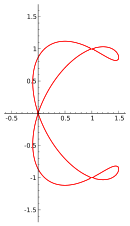
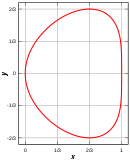
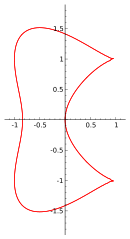

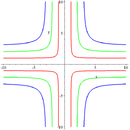

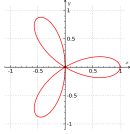
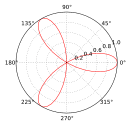
Various combinations of coefficients in the above equation give rise to various important families of curves as listed below.
Ampersand curve
The ampersand curve is a quartic plane curve given by the equation:
It is an algebraic curve of genus zero, with three ordinary double points, all in the real plane. [1]
Bean curve
The bean curve is a quartic plane curve with the equation:
The bean curve is a plane algebraic curve of genus zero. It has one singularity at the origin, an ordinary triple point. [2] [3]
Bicuspid curve
The biscuspid is a quartic plane curve with the equation
where a determines the size of the curve. The bicuspid has only the two nodes as singularities, and hence is a curve of genus one. [4]
Bow curve
The bow curve is a quartic plane curve with the equation:
The bow curve has a single triple point at x=0, y=0, and consequently is a rational curve, with genus zero. [5]
Cruciform curve
The cruciform curve, or cross curve is a quartic plane curve given by the equation
where a and b are two parameters determining the shape of the curve. The cruciform curve is related by a standard quadratic transformation, x ↦ 1/x, y ↦ 1/y to the ellipse a2x2 + b2y2 = 1, and is therefore a rational plane algebraic curve of genus zero. The cruciform curve has three double points in the real projective plane, at x=0 and y=0, x=0 and z=0, and y=0 and z=0. [6]
Because the curve is rational, it can be parametrized by rational functions. For instance, if a=1 and b=2, then
parametrizes the points on the curve outside of the exceptional cases where the denominator is zero.
Spiric section
Spiric sections can be defined as bicircular quartic curves that are symmetric with respect to the xand y-axes. Spiric sections are included in the family of toric sections and include the family of hippopedes and the family of Cassini ovals. The name is from σπειρα meaning torus in ancient Greek.
Three-leaved clover
The three-leaved clover is a quartic plane curve
Alternatively, parametric equation of three-leaved clover is:
Or in polar coordinates (x = r cos φ, y = r sin φ):
It is a special case of rose curve with k = 3. This curve has a triple point at the origin (0, 0) and has three double tangents.
References
- ↑ Weisstein, Eric W., "Ampersand Curve", MathWorld.
- ↑ Cundy, H. Martyn; Rollett, A. P. (1961) [1952], Mathematical models (2nd ed.), Clarendon Press, Oxford, p. 72, ISBN 978-0-906212-20-2, MR 0124167
- ↑ Weisstein, Eric W., "Bean Curve", MathWorld.
- ↑ Weisstein, Eric W., "Bicuspid Curve", MathWorld.
- ↑ Weisstein, Eric W., "Bow", MathWorld.
- ↑ Weisstein, Eric W., "Cruciform curve", MathWorld.
- ↑ Gibson, C. G., Elementary Geometry of Algebraic Curves, an Undergraduate Introduction, Cambridge University Press, Cambridge, 2001, ISBN 978-0-521-64641-3. Pages 12 and 78.










